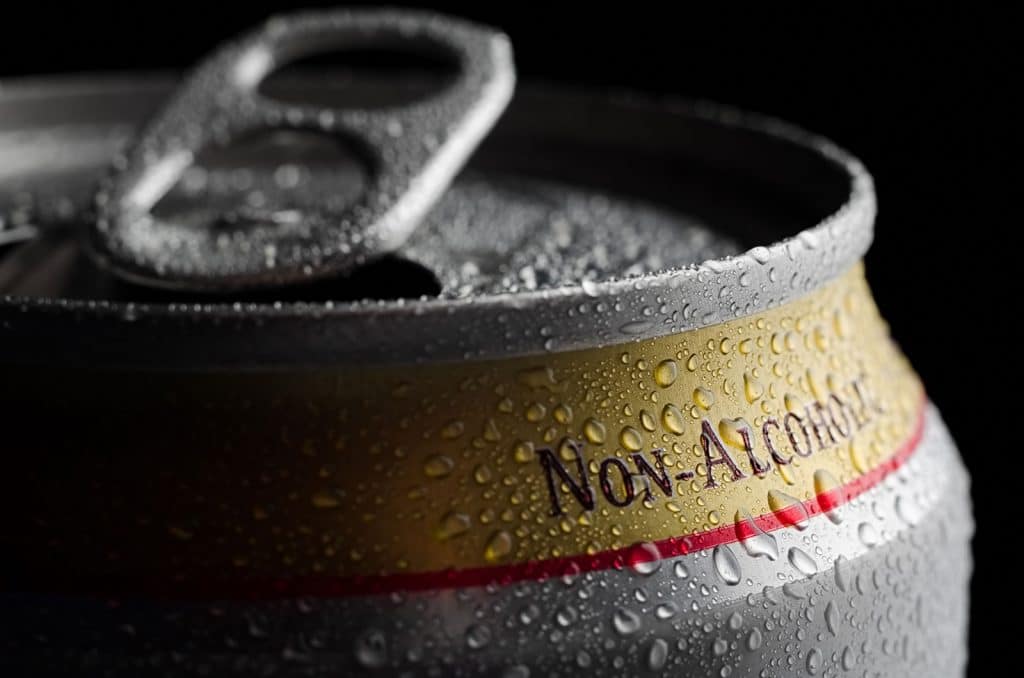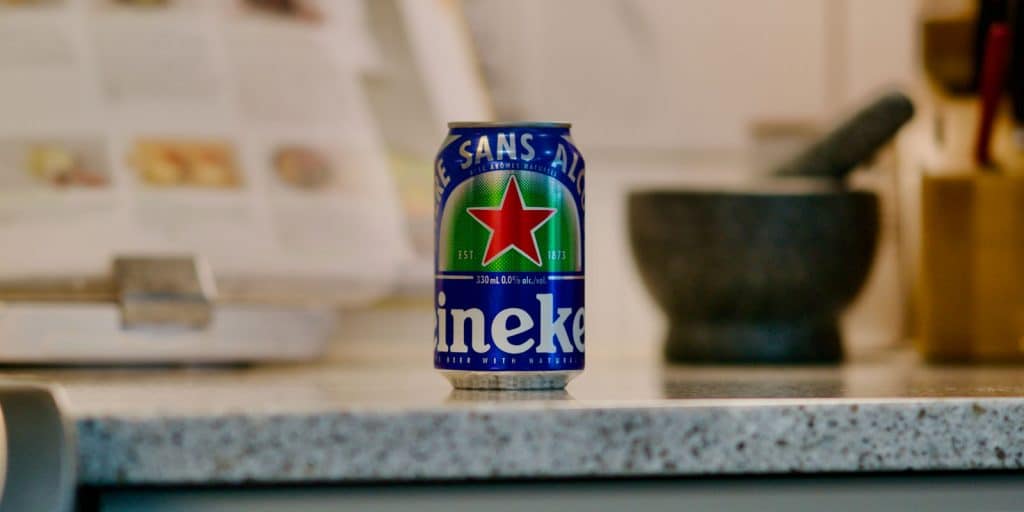The short answer is: It depends. What works for one person in recovery might not work for other folks. Also, what might work one day for one particular person might not work the next day for the same person. Hence, “One Day at a Time.”

Table of Contents
- 0.1 Is Non-alcoholic Beer Truly Free of Alcohol?
- 0.2 What Is Non-alcoholic Beer?
- 0.3 Why Do People Drink Non-alcoholic Beer?
- 0.4 The Dangers of Non-alcoholic Beers for Recovering Alcoholics
- 0.5 About That Trigger …
- 0.6 Bar Hopping Is Tempting
- 0.7 “Getting in the Groove”
- 0.8 The Danger of Romanticizing Drinking
- 0.9 Is it OK to Drink Non-alcoholic Beers While in Recovery?
- 0.10 Are There Any Alternatives to Non-alcoholic Beer?
- 0.11 Get Help to Develop and Maintain an Alcohol-Free Lifestyle
- 1 FAQ
Is Non-alcoholic Beer Truly Free of Alcohol?
No, it’s not. The law says that alcohol-free beer actually just has to be less than 0.5% by volume. That means that it takes 10 non-alcoholic beers to equal the alcohol in one full-alcohol beer.
What Is Non-alcoholic Beer?
Beer is one of the oldest beverages in the world. The ancient Egyptians brewed very strong beer, about 10% by volume. They also brewed a malt beer that was near alcohol-free. Modern non-alcoholic beer is brewed the same way as regular beer with one difference: The alcohol is removed. Removing all of it is impossible because some are naturally produced even after the rest is removed.
Why Do People Drink Non-alcoholic Beer?
They drink it to enjoy the taste of beer without becoming drunk. They drink it because it contains fewer calories than regular beer. Some folks might just like the taste of the particular brands. O’Doul’s is one of the most popular variants in the United States. Clausthaller is one of the most popular variants in Germany.
The Dangers of Non-alcoholic Beers for Recovering Alcoholics
For some addicts, any alcohol at all will cause a relapse. Some folks have to eschew cough medicine, and some religious folks might not be able to receive the Cup at communion and must receive under one kind. Even people who can stand 0.5% or less by volume might be triggered because of the smell or taste of the beer. Still, others might be triggered because going to the bar with their friends reminds them of the past three-day benders. Folks who take Antabuse (Disulfiram) will get sick to their stomachs because it reacts with alcohol.
About That Trigger …
That trigger isn’t just philosophical: It’s real. Smells have the strongest effect on memories of all the senses. Why is that?
All of the other senses stimulate the thalamus, but smells react directly with the olfactory bulb in the brain, bypassing the thalamus. This direct connection is why smells are such a powerful trigger.
Bar Hopping Is Tempting
Addicts might have had fantastic times in bars. They might even have met their significant others in a bar “back in the day.” Also, bar hopping is seen as acceptable in society. Not going to bars, especially when someone is younger than 30, might be seen as socially weird or unacceptable. So, some addicts don’t want to appear “out-of-touch,” so they go to the bar.
Human beings are social animals. If your friends go to the bar, it’s natural to want to go with them so that you can belong. Addicts sometimes have to decide about the people they associate with and form friendships. Those decisions are quite difficult, so “just going to the bar” is far easier.
“Getting in the Groove”
Society teaches that drinking is normal. In TV shows and movies, someone enters a room or goes to someone else’s home or business, and the first question the host asks is, “Do you want a drink?” Advertising slams the point home that people can destress, have fun, and even get pro-bono psychological services from the “wise old bartender.”
The idea is to sell alcohol and make a profit. Telling people that they cannot have fun unless they “get in the groove,” whether it’s good for them or not, is very effective. Addicts must watch out for that tropes and look out for themselves.
The Danger of Romanticizing Drinking
People get engaged. Then, how do they celebrate? They buy a bottle of Dom Perignon and share it with their friends. Wine connoisseurs are seen as refined and debonair. Dean Martin always had something amber in his glass while singing, even when he could barely stand. Again, the point is to sell more alcohol. And marketing O’Doul’s and other non-alcoholic beers as an alternative to full-alcohol beer is an attempt to get people who wouldn’t normally spend money on beer to buy the O’Doul’s.
Is it OK to Drink Non-alcoholic Beers While in Recovery?
This is an interesting question. Some folks do quite well and don’t relapse. Most 12-step programs, however, recommend against it. They call it a slippery slope. Addiction is powerful. It never lets anyone go completely. As the saying goes, “Once an alcoholic, always an alcoholic.”
If someone drinks so heavily that stopping could cause a life-threatening condition called delirium tremens, or DTs, using non-alcoholic beer might be a consideration when weaning the person off of alcohol. As with anything of this nature, you should consult your doctor.
Are There Any Alternatives to Non-alcoholic Beer?
At the risk of sounding obvious, there are many. You can choose water, soda, or juice, just to name three. The trick is either to overcome the stigma of “not drinking” or just to ignore it. Your life is more important than appealing to people who have no inkling about your struggles with addiction. One of the best ways not to get any guff about not drinking is to volunteer to be the designated driver. In many cases, you can drink truly non-alcoholic drinks for free.

Get Help to Develop and Maintain an Alcohol-Free Lifestyle
Despite all the claims of American rugged individualism, beating addiction is very much a “team sport.” Groups of people who understand where you are simply because they’ve been there are a great support when you’re feeling alone, powerless, and helpless. People in the groups who have completed more of the 12 steps can offer advice on how best to complete the steps. Your sponsor will have access to other services to help you both to get started and maintain the gains you make in beating back your addiction.
Mark Twain said once that quitting smoking cigars was easy. He’d done it a hundred times already. Although that epigram is both pithy and humorous, it carries a serious undertone. You never stop being an alcoholic. Drinking O’Doul’s, for the majority of addicted folks, won’t get you through the tough times. You have to work at it every day. But that’s why the team concept behind 12-step groups is crucial to recovery.
You have enough societal influences telling you to drink, so having a group behind you helping you not to drink is powerful. Let yourself rely on these folks. They’re all rooting for you to succeed. There’s a great saying: Listen when people tell you who they are.
There are people who will be uncomfortable because you’re choosing not to partake. It’s far easier for them if you would, “Just shut up and have a drink.” Their “easiness” is not your responsibility. Maintain your sober goals. In fact, as you progress, be one of the people upon whom newcomers to the world of recovery can rely. Call out the “alcohol bullies” for their behavior. No one should ever ask people why they’re not drinking. They should just hand them sparkling water and be done with it. You can make a difference if you hold these people accountable for their attitudes. You might just save someone’s life.
FAQ
Can you drink non-alcoholic beer while driving?
Is it ok to drink non-alcoholic beer every day?
Is non-alcoholic beer really non-alcoholic?
Can recovering alcoholics drink non-alcoholic beer?
Can you drink non-alcoholic beer at work?
Can you drink non-alcoholic beer in public?
What is O’doul’s beer alcohol content?
Published on: 2022-09-12
Updated on: 2025-04-09


